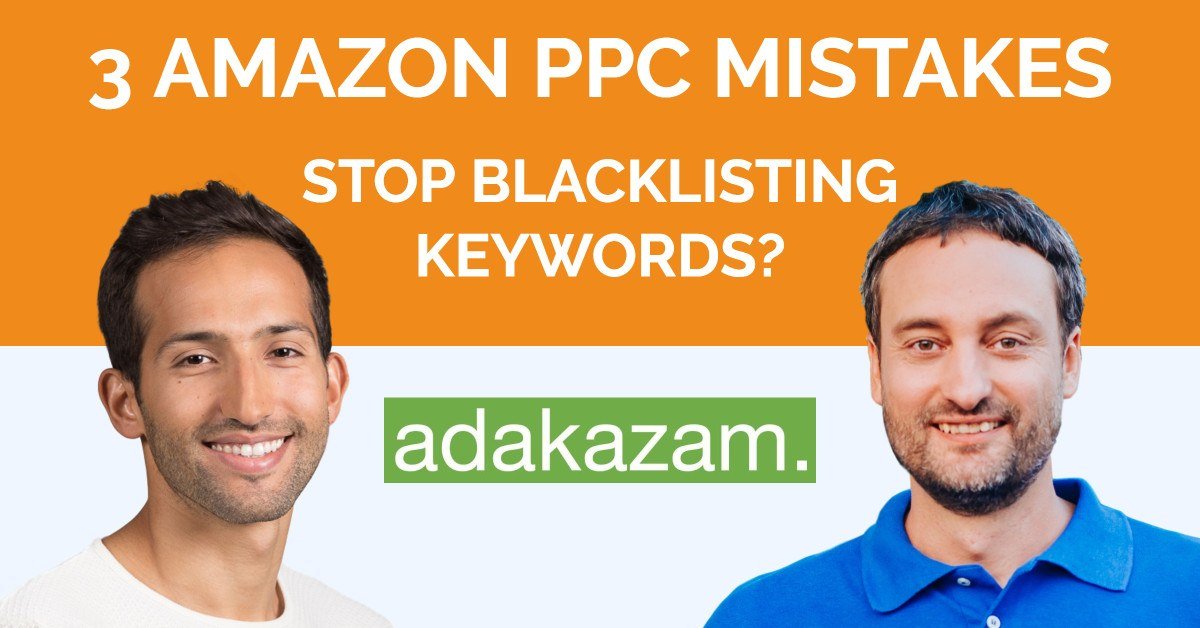We are talking to Tarik Berrada Hmima from M19 (formerly known as Adakazam) about 3 common mistakes Amazon sellers constantly make in their PPC campaigns. Tarik explains how to optimize your PPC campaigns and stop wasting too much money, what are the key indicators that Amazon uses to decide what products to show in sponsored positions, and how M19 software helps you to maximize your profit.
Blacklisting bad keywords
People tend to think that the best way to do PPC is to blacklist bad keywords. The thing is that when you blacklist a keyword, it’s gone forever and it is one of the reasons why you might avoid doing so.
There are some factors that affect keyword performance, such as bad timing or bidding too low.
Just pick your favorite keyword, analyze the data and look at the performance of this keyword over time. Tarik assures you that sometimes even your best keyword does not perform as you might like.
So imagine – if you decide to blacklist all bad-performing keywords, it means you are going to blacklist your best keyword as well because for some time its temporary bad performance. This is why it is very dangerous to do automatic blacklisting!
What you need to do in this case is to lower your bidding to a minimum, rather than getting rid of the keyword. If the situation is really bad, put it at the bare minimum. In the worst-case scenario, it will get smaller traffic but the cost will be low and maybe you will get a better ACoS.
The other benefit of lowering your bids – it can help revive seasonable keywords and protect you from making decisions based on data which is usually not enough.
Overuse of phrase or broad match
If you use a phrase or a broad match for every keyword that works well, you are basically letting Amazon decide everything for you. Even more, you will always pay the highest bid possible between all the keywords that match the same user search query.
Tarik gives an example: Let’s say you are selling board games. Someone types “board games for kids”. You might have a keyword “games” as a phrase and you might have “board games” as a broad match keyword for the same ASIN. In this case, the search term “board games for kids” will be matching “games” as a phrase and “board games” as a broad match.
Amazon will decide what product to show in a sponsored ad based on the highest bid between your two keywords. That means you have traffic from different entry points and Amazon will pick the highest entry points. This situation will lead you to spend too much money instead of spending less on a better performance.
So when you use phrase keyword, make sure that it’s not captured in another broad or in another automatic ad group. It should be associated with a phrase negation that is applied to the other entry points where it works.
This is also the case with the exact keywords. When you have the exact keyword, you should make sure that it is negated on all the phrase and broad keywords as well as automatic ad groups where it can possibly be a match. Otherwise, you are going to be bid against yourself.
Another way to avoid this problem is to stop using hundreds of keywords with different matching types. If you have numerous keywords for the same product, you should consider reducing the number. It is always better to have a smaller amount of well-configured keywords rather than hundreds that are not controlled.
All targeted keywords should be coupled with their negated versions!

Bidding very high and flat to guarantee a sponsored position
Doing so, you’ll end up spending too much without getting results. CPC is not the only thing used by Amazon to grant sponsored spot.
However, some people think that putting a high CPC (let’s say 5 euros) will guarantee a sponsored position. Even though your competitor is bidding 1 euro in a second-price auction that is used in the Amazon, it is very dangerous to bid high. There are different reasons: Your competitors are using more smarter tools thal progressively increase their bids to get traffic. It means you will be paying more for the same traffic.
Another reason – Amazon uses different indicators to estimate the value of showing your product in a sponsored position: CPC, that lets to decide if it’s worth to show your product, an estimation of the click-through rate, which means if they show your product and it gets clicked, they estimate this and use this quantity to make a decision, and an estimation of the conversion rate – the probability of a customer buying your product.
By using these three main indicators, Amazon predicts the revenue they will get through one click. With this information, Amazon makes its own internal auction and decides, what products to show in a sponsored position.
How does M19 software work?
M19 software uses artificial intelligence. Tarik explains that it is simpler than most people might think – basically, it’s algorithms that are making decisions based on data.
So M19 takes your advertising data and predicts if a customer buys a product if you show this product using a certain keyword. M19 also estimates how the competition is doing on this keyword and guarantees your cost and your performance is under the target.
The main goal is estimating the right bid and CPC in order to stay under the target and maximize sales.
Tarik gives an example of how M19 can optimize your PPC costs. One of his customers used to spend 20k on advertising per month and had a very high ACoS, almost 90 %. Since he had a lot of sales made through organic traffic, he used PPC to rank and make more sales on the organic part.
It took only 2 months for M19 to improve this seller’s ACoS from 90 % to 70 % while generating more sales. Right now, after 4 months, the ACoS is 60 % and the sales are doing even better.
Another example – a French seller, selling mainly in France. His goal was to start selling in other marketplaces so M19 helped him with managing keywords. As a result, the share of France sales is now 30 % of his overall sales. So M19 services enable you to start selling in new marketplaces without exceeding your costs.
Find more on their website.
Mention ORANGE KLIK when contacting M19 team – fill in the contact form on their website.
Meet M19 team at PPC Congress 2019: https://ppccongress.com
About Tarik Berrada Hmima
With 6 years experience in Adtech, I have a track record of delivering complex data-based solutions. I have extensive technical experience in both startups and large companies. I’m passionate about using technology to solve challenging business problems, building world-class AI-based tools.



